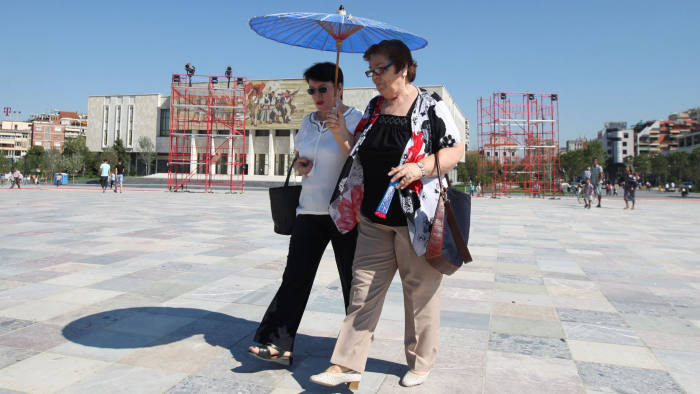The aftershock of a
diplomatic earthquake over accession will take time to subside
Albania, like the rest of the Balkans, has long been a site of geopolitical competition. A century ago, Tirana became the Albanian capital because all of the other major cities were occupied — in the north by Serbs and Montenegrins, in the south by the Greeks, and in the west by the Italians. Today, Albania’s desire for a future inside the EU is clear, but many of its people feel unwanted.
VALERIE HOPKINS

Skanderbeg Square in
central Tirana. Most people in Albania would prefer to see their country join
the EU © Florion Goga/Reuters
Last week, a 4.9
magnitude earthquake shook the Albanian capital Tirana. There was no damage,
but people streamed out of their homes because the country is still traumatised
by a 6.4 magnitude earthquake in late November that killed 51 people and left
15,000 homeless.
“The second half of
the year was dominated by earthquakes,” the
city’s mayor Erion
Veliaj tells me in his office. “Environmental, political, diplomatic.”
The biggest
earthquake of the diplomatic kind was French president Emmanuel Macron’s veto
in October on the opening of EU accession talks with Albania (and North
Macedonia).
As the UK extricates
itself from the EU, Albania and the other countries in the western Balkans
desperately want to join. However, they now wonder if they will ever be welcome
in the bloc.
In the hopes of
beginning accession negotiations, Albania has been going through a highly
complex judicial vetting process, which saw the ranks of its supreme and
constitutional courts thin out, leaving them incapable of holding trials. The
country is also pushing through a comprehensive law on organised crime that
will ease international co-operation in criminal cases.
North Macedonia took
the highly contentious step of changing its name to unstick a veto from Greece,
only to be stymied by Mr Macron. As the French president seeks to reform the EU
before expanding it, those who want to join find themselves further away than
ever.
“This is a breaking
point,” a friend tells me over a pot of caj mali, mountain tea, in a downtown
café. She says she and her compatriots feel the decision not to open the path
to negotiations was due to persistent anti-Albanian feeling and Islamophobia (though
the country is mixed between Catholics, Orthodox Christians and Muslims).
Most people in the
Balkans would prefer to see their countries join the EU for the economic
opportunities and standards of living it provides. But for a sizeable group,
the bloc, as it wrestles with Brexit, swelling populism, demographic anxiety
and sluggish growth, no longer represents a dream. And with its refusal to
reward a move so groundbreaking as changing a country’s name, it fails to
represent the values that so many have yearned to establish in the region since
the tumultuous 1990s.
There’s a joke in
the Balkans that says if the countries aren’t allowed to enter the EU, citizens
will join anyway — one by one. It is happening. The countries in the region
have collectively lost more than 400,000 citizens of working age in the past
five years, according to recent research by the Regional Cooperation Council.
While there is a
palpable sense that another era is dawning in the Balkans, no one knows what it
will look like. “Now that it is 2020, it is our fourth decade of transition,”
Albania’s former foreign minister Ditmir Bushati tells me over a lunch of grilled
eel and sea bass. “That’s the same amount of time that we had communism here.
And four decades in, there is a risk that the EU could lose the region.”
Meanwhile, he notes,
China is quietly and steadily expanding its influence.
Albania, like the
rest of the Balkans, has long been a site of geopolitical competition. A
century ago, Tirana became the Albanian capital because all of the other major
cities were occupied — in the north by Serbs and Montenegrins, in the south by
the Greeks, and in the west by the Italians. Today, Albania’s desire for a
future inside the EU is clear, but many of its people feel unwanted.
The EU, says Luigi
Soreca, its ambassador to Albania, mobilised resources after November’s
earthquake, treating the country “just like a member state”. Emergency funds
totalling €15m were raised. He says this helped to restore the bloc’s
reputation, which had suffered after Mr Macron’s veto. More will be pledged at
a donor conference in Brussels later this month. But aid is the continuation of
a donor-client relationship, not necessarily the basis for a more equal one.
Even so, it has been
crucial. Now only a few hundred families remain without permanent
accommodation, Mr Veliaj says. Recovery from October’s diplomatic tremors will
take rather longer.
No comments:
Post a Comment